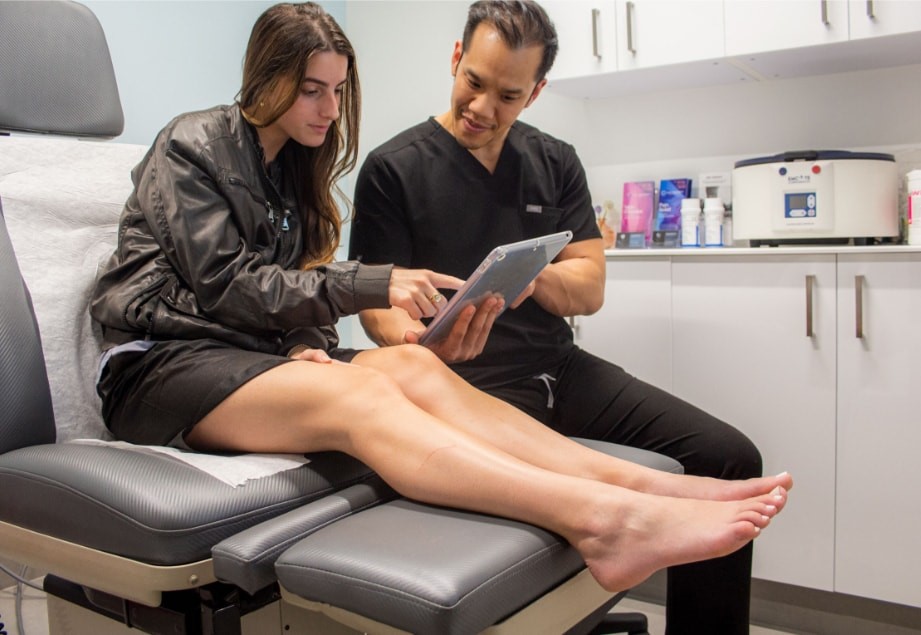Varicose veins are swollen, twisted veins that often appear dark purple or blue. They commonly develop in the legs due to the increased pressure in the veins from standing and walking. For many individuals, what type of doctor treats varicose veins are more than a cosmetic concern. They can cause pain, discomfort, and even more severe complications if left untreated.
Understanding varicose veins is the first step in determining who can treat them and what options are available for relief. While some people experience mild symptoms, others face significant challenges such as heaviness, swelling, and aching in the legs.
Why Do You Need a Specialist for Varicose Veins?
Treating varicose veins effectively often requires specialized knowledge of the vascular system. A general practitioner might diagnose your condition, but you’ll need a vein treatment doctor for proper management and care. These specialists, also known as vascular surgeons or phlebologists, focus on diagnosing and treating conditions affecting veins and arteries.
Without proper intervention, varicose veins can worsen over time. Complications such as ulcers, blood clots, or chronic venous insufficiency may arise, making early treatment essential.
Who Are Vein Treatment Doctors?
Vein treatment doctors, commonly referred to as vascular specialists or phlebologists, are experts in managing vein-related conditions. They possess advanced training in diagnosing and treating issues related to varicose veins, spider veins, and other vascular problems.
These doctors use state-of-the-art diagnostic tools like ultrasound to identify the underlying causes of varicose veins. They focus on improving circulation, alleviating symptoms, and preventing potential complications. Whether you need non-invasive therapies or surgical interventions, vein treatment doctors provide personalized care to address your unique needs.
How Do Vein Treatment Doctors Diagnose Varicose Veins?
When you consult a vein treatment doctor, the diagnostic process begins with a thorough medical history and physical examination. Your doctor will examine your legs for visible signs of varicose veins and may ask about your symptoms, such as pain, heaviness, or swelling.
To get a clearer picture, they often use Doppler ultrasound, a non-invasive test that evaluates blood flow in the veins. This diagnostic tool helps determine whether the valves in your veins are functioning correctly and identifies areas of abnormal blood flow.
What Are the Treatment Options for Varicose Veins?
Vein treatment doctors offer a wide range of treatment options depending on the severity of your condition. Here are some common approaches:
- Compression Therapy:
Compression stockings are often the first line of treatment for varicose veins. These specialized stockings apply pressure to your legs, improving circulation and reducing swelling. - Sclerotherapy:
This minimally invasive procedure involves injecting a solution into the affected veins. The solution irritates the vein walls, causing them to collapse and eventually fade. Sclerotherapy is highly effective for smaller varicose and spider veins. - Laser Treatment:
Endovenous laser treatment (EVLT) or simple laser treatment uses targeted laser energy to close off varicose veins. This procedure is ideal for moderate to severe cases and requires minimal recovery time. - Radiofrequency Ablation (RFA):
RFA uses heat generated by radiofrequency energy to seal off damaged veins. The treated vein is absorbed by the body over time, improving circulation and reducing symptoms. - Surgical Procedures:
In more advanced cases, vein treatment doctors may recommend surgery. Techniques such as vein stripping or ambulatory phlebectomy involve removing or tying off problematic veins. These procedures are typically performed under local or general anesthesia.
What to Expect During Your Vein Treatment?
Your experience with vein treatment will vary based on the severity of your condition and the procedure chosen. Most modern treatments are minimally invasive, meaning they are performed in an outpatient setting with little to no downtime.
Before the procedure, your vein treatment doctor will explain the process, discuss potential risks, and answer any questions you may have. During the treatment, you may feel some discomfort, but pain management techniques ensure a relatively comfortable experience.
Post-treatment, you’ll receive specific instructions to promote healing and prevent recurrence. Many patients notice significant symptom improvement and a boost in confidence following their treatment.
Why Choose a Vein Specialist Over a General Doctor?
While general practitioners can provide initial guidance, vein treatment doctors have the expertise and tools needed for comprehensive care. They stay up-to-date with the latest advancements in vein treatment technology and tailor their approach to each patient’s unique condition.
Vein treatment doctors focus on identifying and treating the root cause of varicose veins, ensuring long-term relief. Their specialized training allows them to handle complex cases and prevent complications effectively.
How to Find the Right Vein Treatment Doctor?
Selecting the right vein specialist is crucial for achieving the best outcomes. Here are some tips to help you find a qualified doctor:
- Check Credentials: Look for a board-certified vascular surgeon or phlebologist with a strong track record in treating varicose veins.
- Read Reviews: Patient testimonials and online reviews can provide insights into the doctor’s expertise and bedside manner.
- Evaluate Technology: Choose a clinic that uses advanced diagnostic tools and treatment methods for accurate and effective care.
- Ask Questions: During your consultation, inquire about the doctor’s experience, success rates, and treatment options.
What Are the Benefits of Treating Varicose Veins Early?
Seeking treatment for varicose veins early can prevent complications and improve your quality of life. Early intervention reduces the risk of developing ulcers, blood clots, or chronic pain. It also enhances circulation, alleviates discomfort, and improves the appearance of your legs.
Moreover, many modern treatments are minimally invasive, offering quick recovery times and lasting results. By addressing the issue promptly, you can avoid more invasive procedures in the future.
How Can Lifestyle Changes Support Vein Health?
In addition to medical treatment, lifestyle changes play a significant role in managing varicose veins. Vein treatment doctors often recommend the following tips to support vein health:
- Exercise Regularly: Activities like walking, swimming, and cycling improve circulation and strengthen leg muscles.
- Maintain a Healthy Weight: Excess weight puts additional pressure on your veins, increasing the risk of varicose veins.
- Elevate Your Legs: Elevating your legs periodically reduces swelling and promotes better blood flow.
- Avoid Prolonged Sitting or Standing: Move around frequently to prevent blood from pooling in your legs.
Conclusion
If you’re dealing with varicose veins, consulting a vein treatment doctor is essential for effective care. These specialists have the knowledge and tools needed to diagnose and treat vein-related conditions, ensuring long-term relief.
Whether you need a simple procedure like sclerotherapy or a more advanced treatment like laser therapy, vein treatment doctors tailor their approach to meet your needs. By seeking early intervention and adopting healthy habits, you can enjoy improved circulation, reduced discomfort, and enhanced confidence in your appearance.
Don’t let varicose veins affect your quality of life. Reach out to a vein treatment doctor today and take the first step toward healthier veins.




